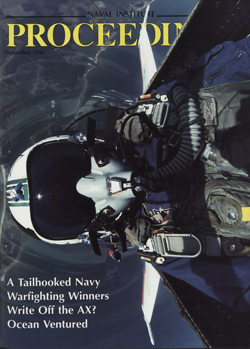Every issue of Proceedings addresses issues relevant to Naval Aviation, but each September we dedicate extra coverage. This month, in addition to features, the departments cover a range of aviation topics. The “Nobody Asked Me, But…” suggests the Marines scrap their Hornets, and a “Professional Note” proposes HH-60Rs can fill a hole in distributed lethality.
In addition to aviation coverage, the winning essay in the rising historian category of the CNO Naval History Essay Contest is published on pages 64-68. An active-duty lieutenant uses historical case studies to highlight shortfalls in the Navy’s peacetime readiness posture.
Proceedings Today continues to soar. This new channel is giving the staff the opportunity to give voice to more authors and increase Proceedings’ coverage of important professional issues between the printed editions of the magazine. In August, we published 17 authors on Proceedings Today. For example, Lieutenant (junior grade) Sam Lacinski recently wrote a three-part series on how the Navy could play a leading role in boost-phase intercept against North Korea’s growing ballistic missile arsenal. If you are not receiving this weekly newsletter coverage, please contact Duffy Perkins at mperkins@usni.org.
This expanded Proceedings content and coverage have been made possible because of the dedicated efforts of the Proceedings editorial and design team led by the tireless efforts and clear vision of Dave Adams. We launched this effort on 2 May, well before the new website is scheduled to come online in January 2018, knowing we would hit some speed bumps along the way. Dave nonetheless guided us to meet the Strategic Plan’s initiative to “establish an online persona” for Proceedings.
In addition, Dave has been a force for good on the monthly magazine issues, whether relentlessly searching for the right photo or working hours into the night to help an author say what he or she wanted to communicate more clearly and more tightly.
He invested his energy and passion in Proceedings, Proceedings Today, and the Naval Institute since before he officially reported on board.
So it is with deepest professional and personal regret I report Dave has left the staff to take an incredible opportunity in industry. He will be missed, but we are confident you will see his byline in future issues.
Fortunately for Proceedings and the Naval Institute, we have Dave’s relief as Deputy Editor-in-Chief already serving with the Proceedings team. Retired Navy Captain Bill Hamblet has been on the staff since September 2016. Bill served on the Naval Institute’s Board of Control/Editorial Board as a lieutenant and wrote for Proceedings often over his Navy career. Bill brings that same passion, vision, and integrity that Dave gave us.
Fred H. Rainbow
Editor-in-Chief/Life Member
WHERE WE WERE

September 1917 Proceedings – In an appreciation marking the July 1917 passing of Rear Admiral Stephen B. Luce, Naval Institute President Rear Admiral Bradley A. Fiske wrote, “It was Luce who discovered Mahan, when Mahan was an obscure commander, and persuaded him to undertake the presidency of the new War College; it was Luce who steered Mahan along the right steps in a career that was to make him famous around the world; and it was Luce who inspired and made possible Mahan’s epochal work The Influence of Sea Power on History.”
September 1967 Proceedings – “An almost unchallenged postulate of modern military thought is the elevation of the offensive form of war.” In his essay “The Twentieth Century Penchant for the Offensive,” Air Force Lieutenant Colonel Ray L. Bowers continued, “As the 20th century began, the grand concepts of naval warfare introduced by the American theorist Alfred Thayer Mahan earned rapid and broad acclaim. Mahan saw a Navy’s strategic task as principally offensive and straightforward—to meet and defeat the enemy’s force of capital ships, thereby assuring control of the vast areas of ocean communication. Having thus won command of the world’s sea routes, the victor might then attain ultimate wealth and world power.”
September 1992 Proceedings – “Naval aviation is at a crossroads,” Commander James A. Winnefeld Jr. wrote in “It’s Time for a Revival.” “Although its mission is robust and its men and women have never been more talented, naval aviation needs a cultural renaissance—one that addresses the causes, not just the symptoms of our problems. We must be willing to make the difficult and painful decisions required by an evolving national culture and the new environment defined in the nation’s National Military Strategy.”
A. Denis Clift
Golden Life Member


